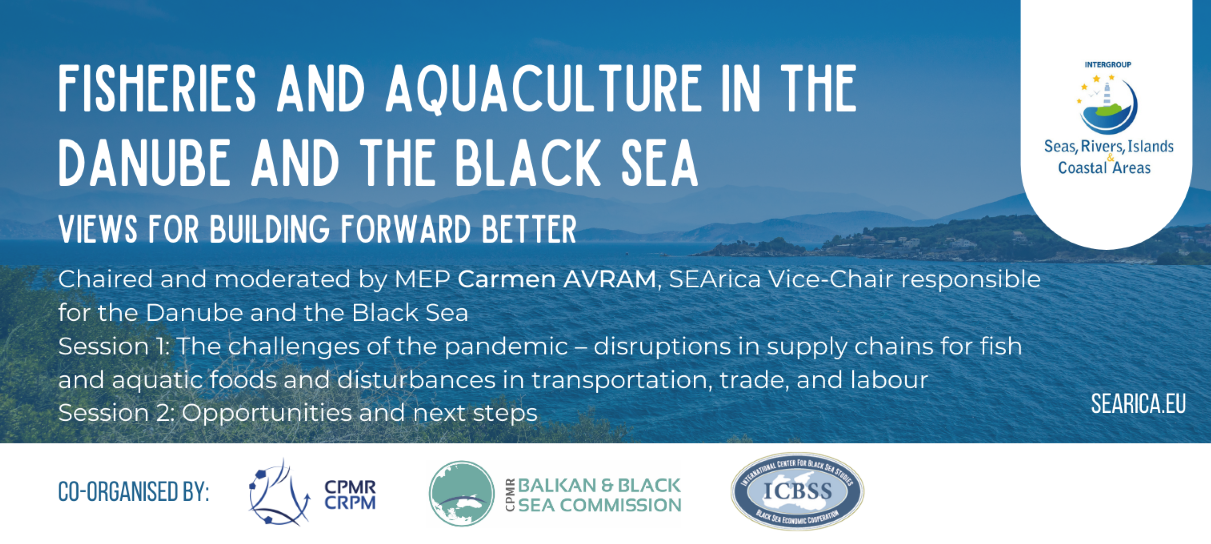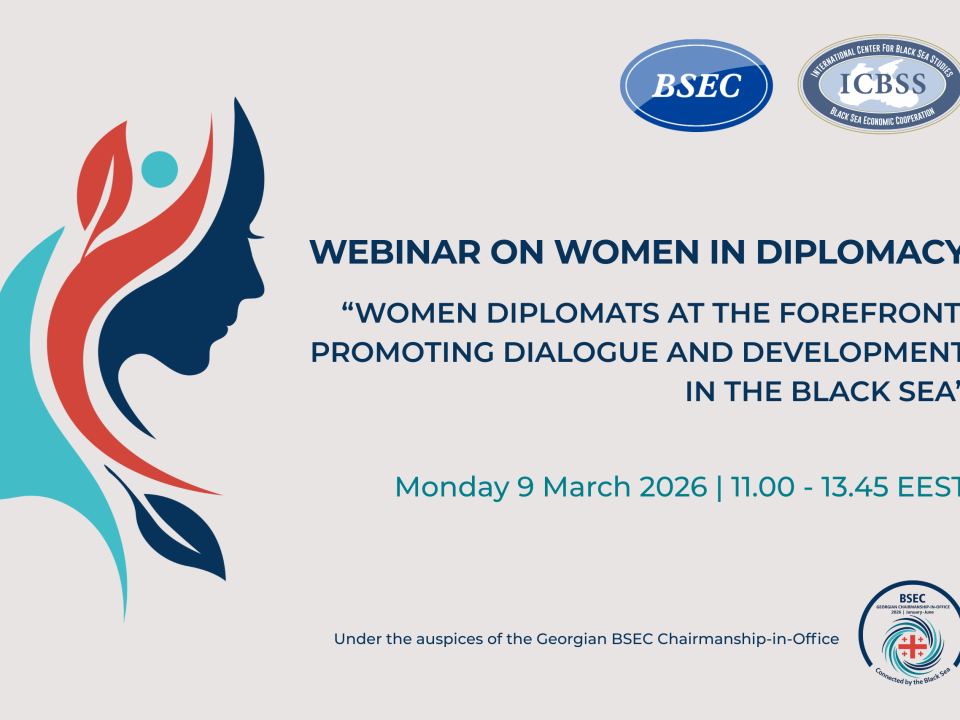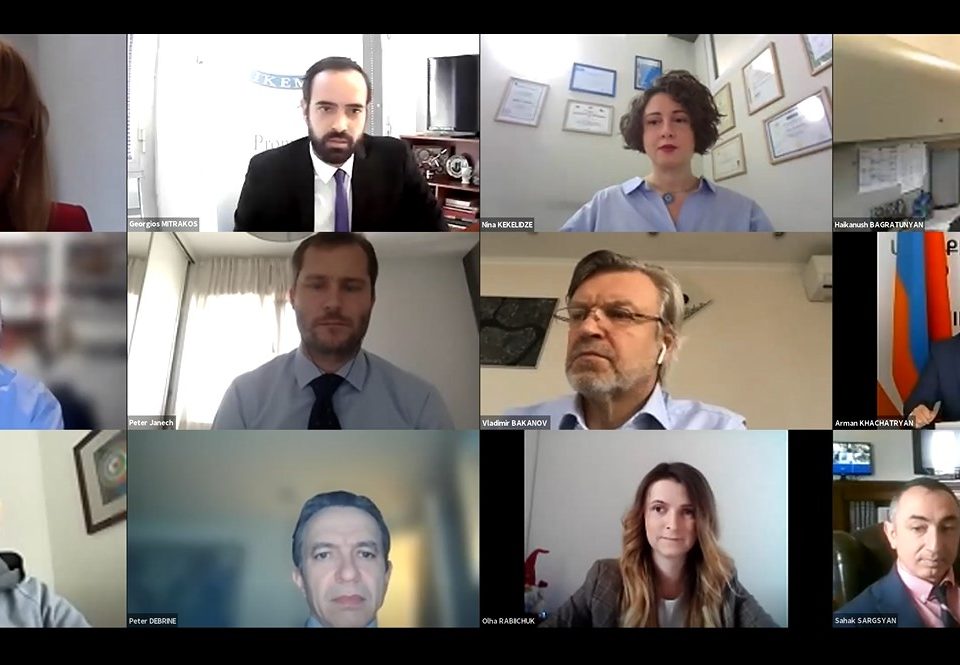
PRESS RELEASE
SEArica online Conference on the Black Sea:
Fisheries and Aquaculture in the Danube and the Black Sea region: views for building forward better
hosted by MEP Ms. Carmen AVRAM
(22 April 2021)
The International Centre for Black Sea Studies (ICBSS) co-organised together with the Balkan and Black Sea Commission (BBSC) of the Conference of Peripheral Maritime Regions (CPMR) which holds the secretariat of the Seas, Rivers, Islands and Coastal Areas (SEArica) Intergroup, the online Conference entitled “Fisheries and Aquaculture in the Danube and the Black Sea region: views for building forward better”, on Thursday 22 April 2021.
Fishing and Aquaculture are among the hardest hit sectors during the pandemic of COVID-19, as demand for Fisheries and seafood has been experiencing a dramatic downturn, due to preventative measures against COVID-19 that have led retailers, restaurants, and other large-scale buyers to reduce or temporarily close down their activities. Furthermore, sectors on which the Fisheries and seafood industries depend on, such as logistics, have also been affected by the situation. The fishing and Aquaculture production sectors are extremely diverse, both freshwater and marine, and of significant socio-economic importance to the wider Black Sea region. The measures adopted to contain the COVID-19 outbreak at national and international level, have impacted directly or indirectly on the operations of the sectors, resulting in challenges but also opportunities for the next day.
Therefore, the conference’s aim was to provide a dialogue platform amongst EU, national policy-makers and key regional stakeholders to encourage a debate that will allow for the better understanding of the challenges, as faced by stakeholders on the ground, and the different opportunities that derive from the various EU policies, strategies and initiatives in this diverse but with high potential region.
The conference was divided into two sessions. The first one addressed the challenges of the Fisheries sector related to the pandemic, such as disruptions in supply chains for fish and aquatic foods caused by disturbances of transportation, trade, and labour. The second session discussed opportunities and next steps for the post-COVID-19 era.
The event was chaired and moderated by MEP Carmen AVRAM, SEArica Vice-Chair responsible for the Danube and the Black Sea. At her welcome note, Ms. Avram stressed the need for immediate action as well as longer-term strategic initiatives that will secure the economic, social and environmental sustainability of Fisheries and Aquaculture in the Black Sea. More specifically, MEP talked about the promotion of decent working conditions and the support of livelihoods of fishers and Aquaculture farmers, the promotion of direct sales and innovative marketing channels, the enhancement of the access to social protection systems to reduce vulnerability and the support of investment in the Fisheries and Aquaculture sectors, as well as about the evaluation of the effects of reducing fishing pressure on natural resources.
During Session 1, the prominent speakers presented the challenges of the pandemic and exchanged views about the disruptions in supply chains for fish and aquatic foods and the disturbances in transportation, trade, and labour.
Ms. Barbara FOCQUET, Deputy Head of Fisheries Management Mediterranean and Black Sea (MARE.D.1) Unit, Directorate-General for Maritime Affairs and Fisheries (DG MARE), European Commission, highlighted the opportunities for Fisheries and Aquaculture in the Black Sea. Ms. Focquet’s presentation focused on the Common Maritime Agenda for the Black Sea. Following, she analysed the 4 pillars of the Black Sea SRIA, talked about the new Fisheries governance for the Black Sea and its deliverables, as well as about the EU financial support to mitigate the impact of the COVID-19 outbreak.
Mr. Valentin MOLDOVEANU, Acting President of the CPMR Balkan and Black Sea Commission (CPMR BBSC), Tulcea County Councillor (Romania), and Danube Delta FLAG Manager, presented the case study of the Port of Sulina in Romania, as part of the Danube Delta biosphere reverse, which is recognized for the great diversity of habitats and life forms that is hosts.
Mr. Catalin PLATON, President of Romfish Association (representative association for Romanian Aquaculture sector) and Member of Aquaculture Advisory Council, gave a brief overview of the Romania hydrographic network. In continuation, he emphasized the evolution of the Romanian Fisheries and the structure of the Aquaculture sector. Finally, he mentioned the problems identified, such as the low capitalization and high levels of bureaucracy, that constitute challenges for financing the sectors in the Black Sea.
Dr. Viktor KOMORIN, Director of the Ukrainian Scientific Center of Ecology of the Sea (UkrSCES), Member of the Board of Directors of the International Centre for Black Sea Studies (ICBSS), presented the environmental effects of Covid-19 on the Aquaculture & Fisheries sectors in the Danube & Black Sea and shared ideas for the future.
At the second part of the conference, the Session 2, the prominent speakers shared their views regarding the opportunities and the next steps for the sector of Fisheries and Aquaculture in the Danube and the Black Sea region.
Mr. Iain SHEPHERD, Senior Expert - Maritime Policy - Blue Growth, Data and Innovation, Maritime innovation, Marine Knowledge and Investment (MARE.A.1) Unit, Directorate-General for Maritime Affairs and Fisheries (DG MARE), European Commission, focused on the European Green Deal. Furthermore, he outlined the advantages of seaweed and shellish Aquaculture to the direction of the Circular Economy promotion, Biodiversity protection Decarbonisation fostering.
Professor Dr. Baris SALIHOGLU, Black Sea CONNECT Coordinator, presented the Black Sea Strategic Research and Innovation Agenda (SRIA). As he underlined “Black Sea ecosystem is susceptible to increasingly negative impacts of global climate change and multiple natural & human-induced stressors, such as eutrophication, hypoxia, overfishing, invasive species. Generating knowledge is necessary to assess & mitigate these stressors.”
Mr. Konstantin PETROV, Subregional Coordinator for the Black Sea, General Fisheries Commission for the Mediterranean (GFCM), Food and Agriculture Organization of the UN (FAO), stressed the role of the GFCM in the Black Sea and the GFCM analysis on the impact of Covid-19 on Fisheries and Aquaculture. To this point, he outlined the 2021-2030 Sustainable Fisheries and Aquaculture Strategy, as well as the next steps and future plans for cooperation.
Mr. Alexei NISTREAN, Executive Manager, Organization of the Black Sea Economic Cooperation Permanent International Secretariat (BSEC PERMIS), talked about the cooperation perspectives the filed of Fisheries and potential areas for joint interaction in the Black Sea region. Moreover, he presented the BSEC proposals for an enhanced cooperation and the perspective of interaction for joint projects within the BSEC family.
Dr. Cristina SANDU, President, International Association for Danube Research (IAD) (Austria) and Dr. Simion NICOLAEV, Advisory Group on Environmental Aspects of the Management of Fisheries and other Marine Living Resources, Commission on the Protection of the Black Sea Against Pollution (Black Sea Commission), talked about the establishment of fish stock recovery areas (no-take zones) in the Black Sea region, as a key measure for sturgeon and fish populations revival.
Mr. Ivo HRISTOV, MEP, SEArica Member, and PECH Rapporteur on the “Challenges and Opportunities for the Fishing Sector in the Black Sea”, presented the ambition of the report for the promotion of local sustainable fish products and discard and waste decreasing.
Mr. Davit DADIANI, Chief Specialist of International and Public Relations Division of National Environmental Agency of Georgia, explored the opportunities and next steps for Georgia, and presented some key facts about Georgian fishery and Aquaculture sector, as well as the challenges occurred by the pandemic. Besides, he talked about the prospects for the sectors’ development, and stressed the fact the country has elaborated the first ever management plan for Aquaculture zone in Gonio (Ajara Region, CPMR BBSC member).
In addition to the presentation of Mr. Dadiani, Mr. Konstantine TOPURIA, First Deputy Mayor, Municipality of Poti City of Georgia (CPMR BBSC member), talked about the important role that the city plays in the Georgian economy, as it is a transport hub for the whole country given its location.
During Q&A, speakers, participants and organisers has the opportunity to exchange multiple views about the above-mentioned issues, and to highlight important issues for future discussions and next steps.
The webinar was open to public and welcomed the participation of a wide range of regional stakeholders. In total, more than 100 participants from the wider region joined the webinar.
This was the second SEArica Conference on the Black Sea, co-organised by ICBSS & CPMR BBSC. For previous ICBSS webinars, visit https://icbss.org/webinars/.



